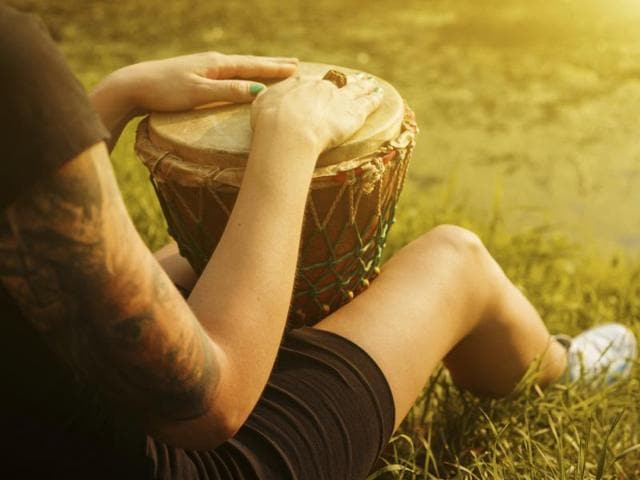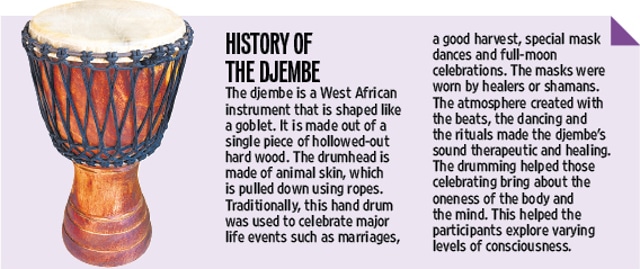Here’s why you should play the djembe for your overall well-being
The djembe is the latest draw for wellness enthusiasts. Experts share more about the benefits of playing this humble West African drum.
City dwellers are always on the lookout for interesting alternative therapies. Now, playing the djembe, an African drum, is gaining popularity among wellness enthusiasts. In fact, the sight of people playing the djembe in public spaces, especially malls, has become quite common in Mumbai.

“I have been organising open drum circles in the city for over four years. It started as a small group of people, who would gather on the streets of Mumbai. The agenda of this gathering was to use the drums to let go of our worries, sorrow and stress. I organise drum circles in association with a mall in Kurla, every Saturday,” says Amrut Bhat, a city-based drum circle facilitator and percussionist.

While it is a known fact that playing music or learning to play music has positive effects on the mind and the body, experts feel that a drum — due to its intrinsic rhythmic nature — has a unique way of benefiting those who play it. What sets it apart is that it is a much simpler musical instrument as compared to a guitar or a harmonica.
Varun Venkit, a drum circle facilitator, and founder of Taal Inc, says, “A community drum circle, as we know it today, is different from the ones used in traditional healing experiences.” Venkit’s organisation brings “people together in rhythm and positively influences the areas of health and well-being through music and arts”.
He adds that it takes a certain amount of time before the community is ready for a therapeutic drumming session. “Currently, I am India’s only certified teacher of the djembe under the guidance of the grandmaster Mamady Keïta,” he says.

Talking about the health benefits of playing drums, in general, Neeta V Shetty, psychotherapist, says, “Drum training benefits stroke patients, and those with Parkinson’s disease, by regulating their gait and arm control. It helps refine their motor skills. It improves the precision, speed and smoothness of their movements. It also results in better hand-eye coordination.”
Benefits of playing the Djembe
1. Play it alone: While playing it alone, one may benefit from the physiological aspects of drumming (provided one is motivated enough to drum for a long period of time). “It enhances one’s concentration, promotes better flow of oxygen through deep breathing, reduces stress and anxiety, builds stamina, helps you ‘be in the now’ and makes you happy,” says Bhat.
2. Play it with your friends or community members: “This is the best way. From time immemorial, drumming has been and still is a community activity. Take the dhols that are played during Ganeshotsav for instance,” says Venkit. It strengthens communal bonds and teaches tolerance, as each participant plays the instrument as per his/her comfort and skill.
3. Play it with strangers: This kind of drumming helps break barriers and celebrate the one thing that brings us all together — our heartbeats. It acts as a major ice-breaker for shy people, builds confidence, patience, makes one a team player, and enhances one’s listening skills.
“Anything in excess is bad. Music is an abstract stimulus, which arouses feelings of euphoria and craving that are similar to tangible rewards. This increases the dopamine levels in the brain. Therefore, drumming in excess may not be beneficial,” says Shetty.

Don’t play it if:
1. You’re averse to loud sounds.
2. Your shoulder joints, elbows or wrists are injured.
3. You’ve been recommended to keep cardio activity to the minimum.
With inputs from Namrata Dagia, clinical psychologist.
Follow @htlifeandstyle for more.
Catch your daily dose of Fashion, Taylor Swift, Health, Festivals, Travel, Relationship, Recipe and all the other Latest Lifestyle News on Hindustan Times Website and APPs.
Catch your daily dose of Fashion, Taylor Swift, Health, Festivals, Travel, Relationship, Recipe and all the other Latest Lifestyle News on Hindustan Times Website and APPs.





